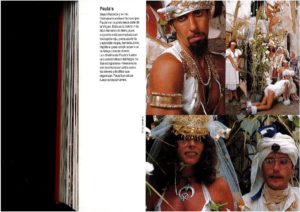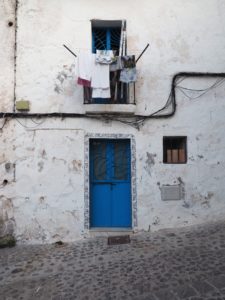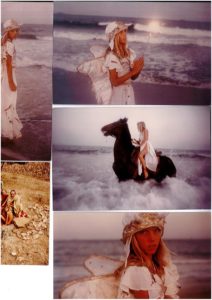Coming of age in Ibiza’s golden years- reliving the dream23rd October 2020
For David Holzer, Ibiza in the 1970s and 80s has always seemed the last word in wild, glamorous romance. To get a taste of what the reality was like, he spoke to a lady who grew up on the island in Ibiza’s golden years and who prefers not to reveal her identity.
She lived in Ibiza until, in 1987, she left to travel the globe as a successful model. Today she lives in Mallorca.
How did you come to live in Ibiza in the first place?
After I was born, in 1972, Mum and Dad wanted to find somewhere they could raise a child. They were told that Ibiza was isolated from the reality of Francoist Spain. There were barely any newspapers or any other connection with the outside world and people went on with their lives without being bothered with Spanish politics, within reason.
This was really attractive to them. When they got to Ibiza, they realised it was a beautiful, raw and empty island home to many intriguing characters from all over the world. This had created a very attractive melting pot with two key ingredients.
The island enhanced great natural beauty. If you were willing to present yourself to the world naked, in the raw without any artificial extras, the qualities you had naturally were enhanced. This was especially attractive to the scene in Ibiza.

On the other hand, Ibiza had a strong intuitive flair for fashion. People who were there in the 70s, 80s and 90s wanted to dress in a way that reflected their own character and often had a strong connection to fashion. Either because they could create it themselves or because they had a good eye and could bring top trending collections to a little shop like the legendary Paula’s at the end of Calle de la Virgen where I lived when I was growing up.
Fashions could be handcrafted, self-made, brought from India, Paris or the hippy market.
Was it a snobbish society?
Underneath the surface, yes. On the surface, though, it was free and easy. Apologizing was the cheapest thing you could do.
One thing that was interesting about Ibiza back then was that, as soon as they got to the island, people with power and money wanted to blend in, to turn themselves into something they weren’t so they could be part of the scene.
Now, as it’s become popular with rock stars, royalty and entrepreneurs making a lot of money, it’s more obviously snobbish. This started in the 90s and it affected people who’d lived here for years. There were the people who were able to make a business on Ibiza and those who were outcast because they weren’t successful. If you don’t make it financially on the island, life can be very hard.
What did your parents do?
Mum never had to work. She had a bar and rented it out. My Dad, we don’t really know what he was doing but he was an Ibiza god. He made parties a success or a flop. They were a lot of people who didn’t do anything. You never knew how they made their living.
It’s a big question but what was your childhood in Ibiza’s golden years like?
Together with my friend Gaida, I’d hitchhike all over the island from a young age. We had to because the infrastructure was so poor. This was the only way to get from one place to another. But it meant we never knew if we were going to get to where we wanted to go or simple things like where we would have lunch.
In the winter we had school but when school wasn’t happening we just moved from one place to another staying with friends. The contrast was pretty amazing. In some fincas there were hippies living without electricity, making their own natural beauty products to sell for example. Other fincas were incredibly glamorous because they’d been done up by people from Milan or somewhere. There were always odd characters wherever we were.
We got into weird situations that we probably shouldn’t have been anywhere near, where we had to deal with strange forces around the freedom of the body and an absence of morality. It’s hard to explain but somehow we knew we were squeezing the last drop of life out of the day and the night. All that was normal was not normal to us, if you know what I mean. But this gave us chances to explore.
How do you feel about your childhood now?
We were living on the edge and it could get a bit dangerous for real. But I look at the lives of children now and they’re often so predictable.
I loved the fact that we were always on the edge of an accident. And we were always meeting people who were so different from us. One summer we made friends with the children from an extremely rich and posh Parisian family. We were fascinated by each other.
You have to remember that our universe was Ibiza, more or less. We knew very little of the world outside the island. This always created a strong reality gap between us and anyone we met. And, in any case, everyone in Ibiza had a different reality so nothing could be standardized. There were no prototypes unless it was something big and obvious like the fact that there were and are more women than men on the island and that woman are more powerful in that society.
Growing up the way I did, and then modelling, gave me enough adventure by the time I was 30 that I could consider a normal life as something rather interesting. I have no regrets at all.
What about your parents? Did they give you rules to live by?
My Mum gave me some advice. But it wasn’t conventional like ‘drink lots of water’.

I’ll give you an example. Calle de la Virgen, where I grew up, is at the foot of the wall separating the Ibiza Old Town from the rest of the city. It used to have an amazing gypsy community. The police would never go there because the gypsies dealt drugs. But there was a strong sense of patriarchy and the members of each clan protected each other. There were all these typical very large families ruled by the grandfather followed by the father and then the sons. The women would take care of the men and have children.
I remember my Mum pointing to all these foreign women who’d fallen in love with gypsy men – who were gorgeous, they all looked like Jesus Christ and sang and danced all the time – and saying ‘Never give away your power to a man, he will drag you down.’
There was this woman, a Dutch model who was madly in love with a gypsy. She disappeared. She died in one of the gypsy houses, something to do with drugs. Ibiza and drugs go very well together.
What I am trying to say is that Mum’s lessons were about the really big things in life. Now, as an adult and mother, I appreciate very much how simple and yet profound her advice was.
And I have strong memories of the asados, the traditional Argentinian-style BBQs we had that took place in the fincas where friends would gather. Looking back, I love the way we were treated as children. All we had to do was stay alive and ideally unhurt. Nothing else was requested from us. Now I cherish this.
I noticed that the great José Padilla who started DJing on the island in 1976, Ibiza’s golden years, just died. You grew up at a time when the music scene on the island was still underground. What was that like?
Music was a big part of the scene. When I was a girl, intellectuals from the mainland and all over the place who wanted to experience a different way of living came to Ibiza and brought their music with them. Styles of music began to develop and unfold. There was music of outstanding quality playing everywhere. DJs like José Padilla were playing before a DJ was a DJ, before that concept took off. In Ibiza now, God is a DJ.
In the Old Town there were Lolas and El Mono Loco, which were great. Later Pacha and Amnesia started and that was the beginning of the afterhours space where you could spend 24 hours nonstop in a dazzling world of beauty, fashion and music where everyone was trying to be a character.
You started modelling when you were 15, right?
No, it was earlier than that. I was spotted first as a child, when I was 7 or 8, and did a photoshoot in collaboration with Paula’s at the end of my street, which I told you about. This was a fantastic little shop that used to change its window display every week. You’d spend at least an hour looking at the new display when you first saw it. That shop created a very strange universe.

The idea for the photoshoot I was part of was that the devil had reincarnated as a child and come down to earth to wander around Ibiza. I was the child and the Paula’s staff were dressed up as weird animals. I was photographed naked coming out of a well wreathed in smoke and riding a horse naked wearing a bridal veil. I was 8! (Bursts out laughing.) It was interesting.
But I was discovered by a very famous agent when I was 15, yes. I quit school and I was off.
How did that happen?
I was on the beach wearing a very little something. He was sleeping next to me and I was the first thing he saw when he woke up from his siesta. He was in shock for half an hour after he saw me. He sat a few meters away from me doing the idiot on the beach thing. He went to my mother to convince her to let him take me away with him to Paris. It didn’t take long. My mother, of course, said yes immediately. Yeah, sure.
So there I was living in a bachelor’s apartment in Paris decorated in the 1960s style, which was a trip. The guy had discovered Claudia Schiffer a few months or a year before he spotted me and thought he had it all figured out. He was super-happy thinking he’d nailed it again with me.
After I was discovered, I went back to Ibiza twice a year until I was 24.
How do you feel about the island now?
I have mixed feelings. I often think I’m not cool enough to live there. I need more standardized business and professional interactions. But, in my personal relationships, it’s hard work to be that cool. I don’t belong in Ibiza anymore. I think it was a sense of survival, mental health survival that took me away. I never went back to live there. But I do think back to Ibiza’s golden years and wonder why the people I know who still live on the island are so attached to those times. Did we dream them? Was it all a dream?
If you’d like to know more about Ibiza’s golden years and how the island became Ibiza, go here.









